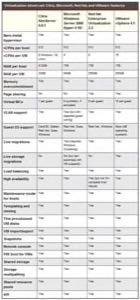Virtualization is now viewed as viable for companies of all sizes. VMware leads the market by a longshot but there are a number of vendors to choose from.

PCWorld compared the leading virtualization vendors in a five-part series that ran earlier this month.
Overall, VMware leads the group of vendors, which included Citrix Xen Server; Microsoft Windows Server 2008 Hyper-V R2; Red Hat Enterprise Virtualization 2.2 and VMware VSphere.
But PCWorld says the gap is closing fast. All are viable in a production environment. The largest of companies still see virtualization as the best option but small and mid-sized companies have options to choose from as seen in this feature chart that PCWorld posted:

Microsoft is VMware’s closest competitor. PCWorld:
Among the three challengers, Microsoft Hyper-V comes closest to VMware vSphere in overall management functionality. However, whereas VMware, Red Hat, and Citrix combine virtualization host and VM management in a single management server, Microsoft spreads the functions across multiple System Center tools. Hyper-V’s advanced capabilities come at the cost of additional overhead, configuration, and complexity for administrators.
That last sentence sums up the challenges to those considering virtualization. It’s no longer the cost that should keep customers from adopting virtualization. Instead, it’s the expertise required that should become one of the biggest considerations.

















